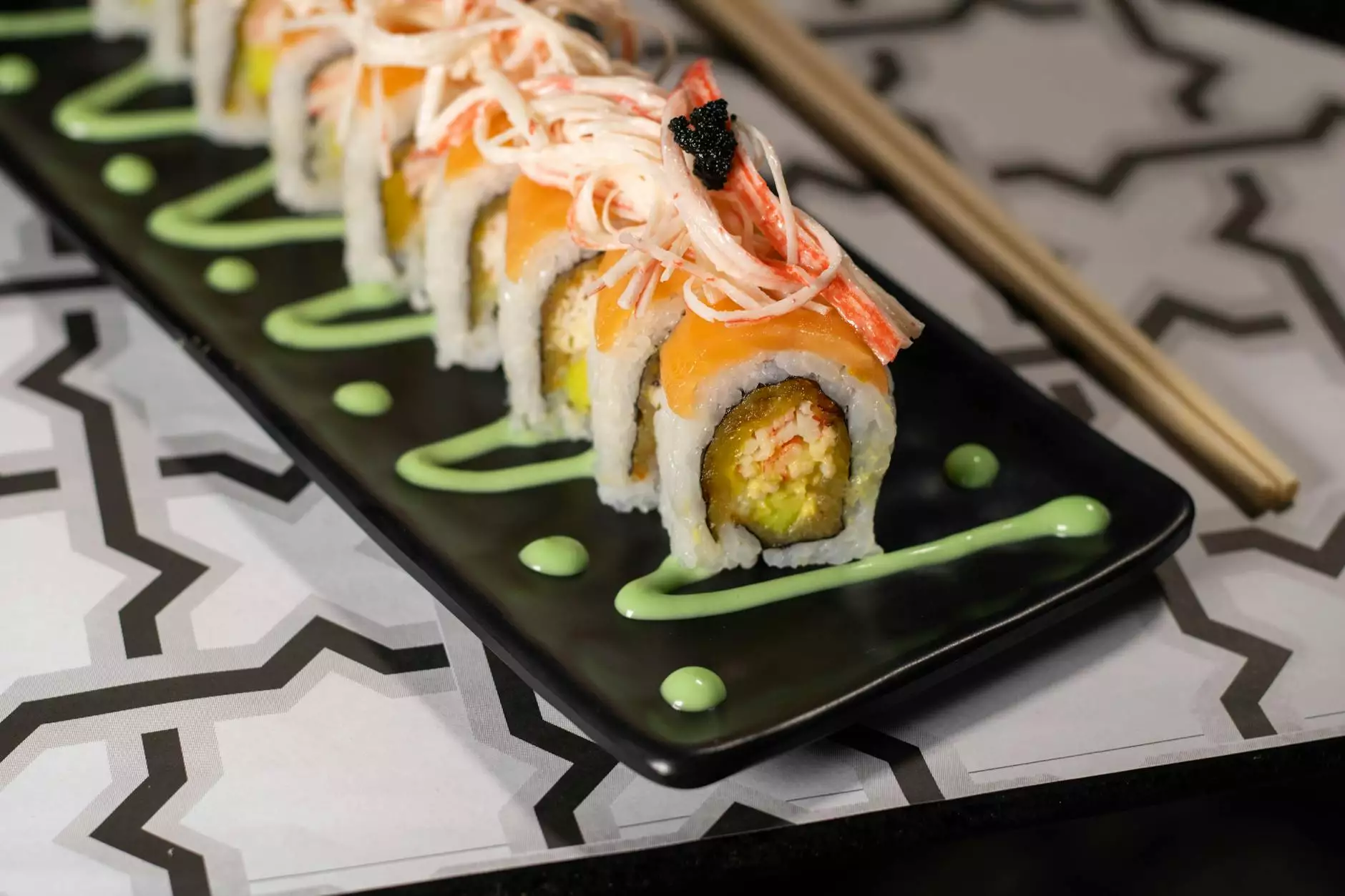Authentic Japanese Wasabi: The Crown Jewel of Japanese Cuisine

Authentic Japanese wasabi has grown beyond its humble origins over centuries to become a celebrated ingredient in global culinary practices. It is not merely a spicy condiment; it is an embodiment of traditional Japanese culture, craftsmanship, and the spirit of gastronomy. This article delves into the fascinating world of wasabi, exploring its history, health benefits, and the best ways to enjoy it in restaurants and sushi bars.
The Rich History of Wasabi
The journey of authentic Japanese wasabi begins in the misty mountains of Japan, where the wasabi plant (Wasabia japonica) thrives in the cool, flowing waters of streams. For over a thousand years, it’s been cultivated by artisans who have perfected the art of wasabi farming. The uniqueness of wasabi can be attributed to its specific growing conditions, which include:
- Cool Temperatures: Wasabi flourishes in regions with cool climates, typically between 10 and 20 degrees Celsius.
- Fresh Water: The plant requires constant flow of fresh, clean water to thrive, often found in mountainous streambeds.
- Shade: Natural shading protects the delicate plant from direct sunlight, essential for its growth.
The first documented use of wasabi dates back to the 9th century, and it has become an integral part of traditional sushi, sashimi, and other culinary delights. While some sushi restaurants around the world use substitutes like horseradish or chemical additives, true connoisseurs *always* seek authentic wasabi for its unique flavor profile.
The Unique Flavor Profile of Authentic Wasabi
Unlike most condiments that provide a simple heat, authentic Japanese wasabi offers a complex flavor experience. Here’s what sets it apart:
Freshness
The taste of freshly grated wasabi is vibrant and green, with a touch of sweetness, making it an exquisite complement to fish. In contrast, tube wasabi or imitation products tend to be overly sharp and lack depth.
Flavor Complexity
Real wasabi has a layered taste, initially providing a light spiciness that stimulates the palate before fading into more herbaceous, subtle notes. This is beneficial for enhancing the flavors of sushi and sashimi, allowing the natural taste of seafood to shine.
Allergic Reactions and Sensitivities
Some diners experience reactions to the spiciness of wasabi, but it differs significantly from chili and can be enjoyed by many. It’s crucial for restaurants and sushi bars to educate their customers about authentic wasabi versus the imitation version, ensuring a memorable dining experience.
Health Benefits of Authentic Wasabi
Beyond its culinary allure, authentic Japanese wasabi is also celebrated for its numerous health benefits:
Rich in Antioxidants
Wasabi is a powerhouse of antioxidants, which help in combating oxidative stress in the body. This can aid in reducing the risk of chronic diseases, including heart disease and cancer.
Anti-Inflammatory Properties
The compounds found in wasabi possess strong anti-inflammatory effects. Incorporating wasabi into your meals may contribute to reduced inflammation in the body.
Digestive Health
Wasabi has been known to promote digestion. Its natural enzymes can help break down food more efficiently, enhancing nutrient absorption.
Antimicrobial Benefits
Research suggests that wasabi can inhibit the growth of harmful bacteria, making it an advantageous condiment when paired with raw fish, as it may help reduce the risk of foodborne illnesses.
Where to Find Authentic Japanese Wasabi
To enjoy the true taste and benefits of authentic Japanese wasabi, it is essential to visit reputable restaurants and sushi bars where quality ingredients are honored. Here’s how to identify them:
High-Quality Sushi Bars
Look for sushi bars that specifically advertise their commitment to using authentic Japanese wasabi. These establishments often take pride in their sourcing and presentation of sushi and sashimi.
Restaurants Emphasizing Authenticity
Japanese restaurants that emphasize traditional techniques and ingredients are more likely to serve genuine wasabi. They often have trained chefs who understand the significance of using authentic ingredients in their culinary creations.
Wasabi Farms
In Japan, some farms offer tours that allow you to taste fresh wasabi directly from the source. This is an unforgettable experience that highlights the true essence of the ingredient.
How to Enjoy Authentic Japanese Wasabi
To appreciate the nuances of authentic Japanese wasabi, consider the following suggestions:
With Sushi and Sashimi
The classic way to enjoy wasabi is with sushi and sashimi. Adding a small amount to a piece of sushi enhances the overall flavour without overwhelming your taste buds.
In Sauces and Dressings
Wasabi can be whipped into sauces, dressings, and marinades to create a unique twist. Combine fresh grated wasabi with soy sauce, vinegar, and sesame oil for a delightful dipping sauce.
In Dishes Beyond Sushi
Don’t limit wasabi to sushi! It can add an exciting kick to pasta, salads, seafood dishes, and even in fusion cuisine to elevate the taste and impress your diners.
Common Myths About Wasabi
There are numerous misconceptions about wasabi that need to be addressed to better appreciate this ingredient:
Wasabi is Just Horseradish
While they share similar heating qualities, real wasabi and horseradish are entirely different plants with distinct flavors. Authentic wasabi is more refined and is actually a different species altogether.
Wasabi is Solely For Sushi
Many believe wasabi is only good for sushi, but its versatility allows it to shine in versatile dishes, from dressings to desserts, elevating flavors in creative ways.
Authentic Wasabi is Always Green
While most real wasabi is green, the color can vary based on many factors, including soil and water quality. An excellent way to determine freshness is the flavor rather than just the color.
Conclusion: Embrace Authentic Japanese Wasabi
Embracing authentic Japanese wasabi is an invitation to discover the depth of Japanese culinary traditions. By seeking out reputable restaurants and sushi bars, you can enjoy the rich flavors and health benefits of this exceptional ingredient. Whether you are a seasoned connoisseur or new to sushi culture, wasabi's unique characteristics will undoubtedly enhance your dining experiences.
To truly appreciate the cultural significance and culinary brilliance of wasabi, venture out to explore restaurants that prioritize using authentic ingredients. Remember, the next time you enjoy a piece of sushi, always ask for the real deal—your taste buds will thank you!



